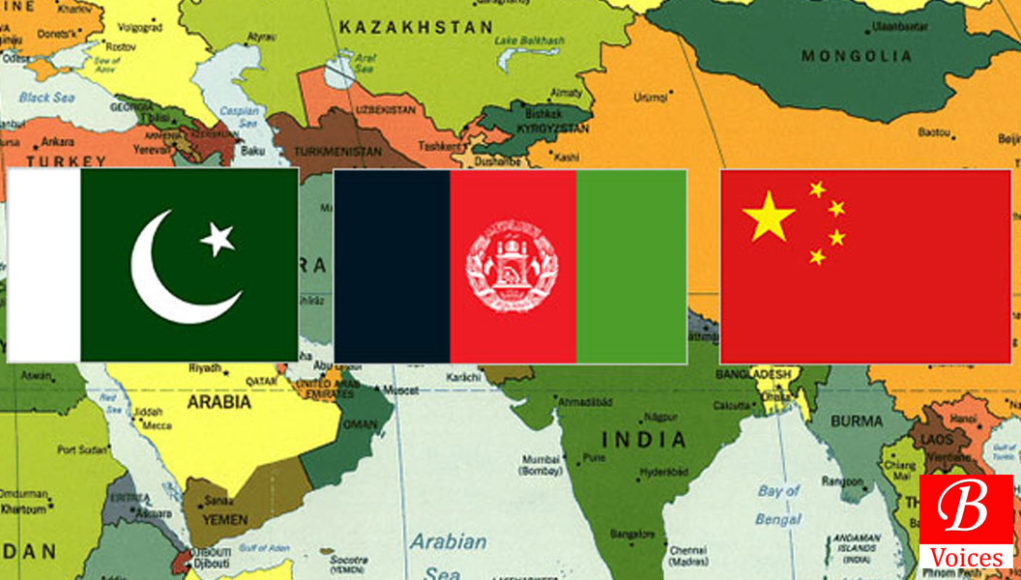 Tahira Khan
Tahira Khan
If we introspect Pak-Afghan relationship in the prevailing political atmosphere, the rapprochement seems to be dead and lost card which is very unfortunate for the South-Asian peace and security. The stalemate has deep historical roots for which we can blame militancy but the most important reason could be the political landscape.
The deadlock escalated after Kabul blast which killed almost 90 people leaving, approximately, 400 injured. Afghan President, Ashraf Ghani, bashed Pakistan for providing safe sanctuary to militants with regard to specific strategic interest.
While giving an interview, he said:
“Can anybody deny that there are Taliban offices in Quetta?”
He further reiterated:
“A state-to-state relationship means an all-out attack; twice I was promised peace, as set of peace agreements. Instead, what did we gain? A vicious wholesale attacks on us. In 2016, again, at the highest levels of the government of Pakistan, I was assured that within days, peace process was going to begin in earnest, and another series of attacks. And, in this environment, how do you expect us to behave with trust?”
The statement explicitly demonstrates the ongoing conundrum which would greatly impaired the strategic collaboration in the region, specifically, in the context of economic progress and fight against terrorism- the new menace of 21st century.
This catch-22 situation has deep historical roots like that of Afghanistan support for Pashtunistan, borderline issues, Jihadist policies, and proxy wars because of which the opportunity for peace prospects looks almost impossible.
If on one side Pakistan has encountered the most troubled neighbour then on the other side has experienced a strategic friendship under the banner of Chinese leadership. Over the years, China has become one of the major allies of Pakistan both in terms of military and economy after latter’s damaged relation with US and abetted crisis with another neighbour i.e. India.
Pakistan and China has been involved in deep-seated economic programs like that of One Belt One Road (OBOR) and China Pakistan Economic Corridor (CPEC). CPEC is Beijing funded project which includes numerous infrastructure and energy projects. The $57 billion CPEC consists of pipelines, roads and rails which will not only developed the underprivileged areas of Pakistan like that of Balochistan in form of Quetta Mass Transit but will also inhibit connectivity between Xinjiang, a far western China, to Pakistan’s Arabian seaport Gwadar.
But, there, again comes the issue of insecurity for which the Beijing could also show cold shoulder as insecurity is the major deathblow to Chinese investment both from Pakistan and Afghanistan. Earlier at 17th summit of Shanghai Cooperation Organization held in Astana, Kazakhstan, Chinese premier Xi Jinping avoided Pakistani counterpart Nawaz Sharif while continuously considered engagement with other leaders which includes even Indian PM, Narendra Modi. The act came in recognition of Chinese inability to compromise on the safety of their workers. In short, Pakistan’s plight lies under the pretext of insecurity which is dependent on her geography. That’s why Pakistan’s location is usually termed as her biggest tragedy.
To manage security situation for CPEC project, particularly, and regional integration, generally, China has provided four ships to Pakistani Coastguard. Yes, analysts has predicted establishment of Chinese naval base in Pakistan which is pre-mature at the moment. But, regional security and political landscape can alter the future strategic prospects of Pak-China relationship.
As far as Afghanistan is concerned, China has started showing interest in the region, especially, after US withdrawal, the initiation of both OBOR and CPEC, and political dynamics of Xinjiang. In this context, China has offered her services as a mediator to create a cooperative and trustworthy trilateral relation. This joint venture, if gets success, will boost the prosperity of decades long war torn region.
Generally, it seems almost impossible but because both Pakistan and Afghanistan is connected to CPEC and OBOR, the consensus between the both is inevitable as well. Islamabad, beside its policy of strategic influence and India centric concerns, knows very well that only a stable Kabul will ensure the eradication of militancy- otherwise not.
In order to start this trilateral experience, the very first step should be people-to-people connectivity. Both states regularly conducts exchange programs involving think-tanks, journalists and parliamentary delegation but, this time, the connectivity will start from the common man. In addition, both the political and physical barriers are required to be reduced if we want beneficial accomplishment of the enterprise. The suggestion came in the aftermath of publishing of paper at a China Institute of International Studies (CIIS), titled “Deepening Practical Cooperation among China, Afghanistan, and Pakistan.”
The resolution of unnecessary border closure and strict enactment of Transit trade agreement deems essential in this trilateral inventiveness. According to statistical data, Pak-Afghan trade has witnessed a wide decrease from $1.573 billion in 2015-16 to $1.482 billion. Besides, the completion of trade route linking Afghanistan with Chabahar port will bring a big chunk of Pak-Afghan trade in Indian hands. Once this Pak-Afghan trade was about $2.5 billion with having normal ties across the border.
Furthermore, Pakistan and China can show investment in Afghan health sector along with the repatriation and re-integration of Afghan refugees. The big three are also needed to conduct agreements and peace contracts along the demarcation of their respective jurisdictions in order to avoid any future conflict.
Sadly, it has been policy of Pakistan to project hard power in Afghanistan despite knowing the latter’s dynamics of polarized political environment. It was needed to invest in soft power which could also bring desired results even if they are strategic or economic in nature.
Despite having cynicism and long standing disputes, such as terrorism and extremism, the mediation offer of China could bring stability in Pak-Afghan relations- keeping in view the demands of ground situation. Reconciliation in Afghanistan is vital to matters relating peace and security and both Beijing and Islamabad are well aware of this fact. The success of CPEC and OBOR lies in the notion of trilateral collaboration with careful and compromising diplomatic attitude from each side. What’s needing is change of policies taken with regard to strategic depth and necessity of militancy to counter the growing Indian influence.
Writer is a team member of Balochistan Voices and a Student of BS (Hons) Political Science in University of the Punjab, Lahore. She hails from Loralai District. Click here to read previous articles written by the author.
Disclaimer: Views expressed in this article are those of the author and Balochistan Voices not necessarily agrees with them.
Share your comments!








